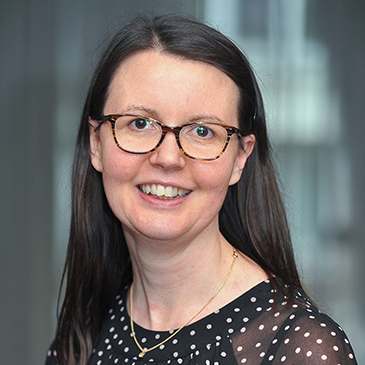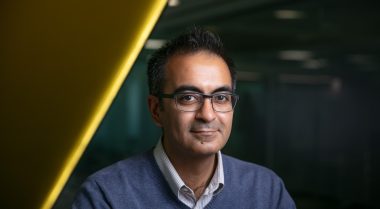Empowering women in health data science to break barriers and embrace opportunities
12 February 2024 | Authors: Rhoswyn Walker, Director of Strategy, HDR UK; Abbey Hart, Communications and Content Officer
This International Day of Women and Girls in Science, our Director of Strategy, Dr Rhoswyn Walker, shares her motivations, career highlights and challenges she has faced as a female leader in health data science.

Rhos has played a pivotal role in establishing Health Data Research UK (HDR UK) in 2018, shaping its vision and bringing together multidisciplinary teams in our mission to unite the UK’s health data to enable discoveries that improve people’s lives.
For International Day of Women and Girls in Science, we chatted with Rhos about the barriers women in STEM often experience and her advice for females looking to enter the world of health data science.
Which areas of health data science interest you most and made you want to pursue this career?
One of the things that excites me the most is bringing the data and technology experts together with the people that use data for health research. It’s great and I’ve learned a lot at HDR UK from working with different technology leaders, from various backgrounds across industry and academia. As a molecular biologist, learning about that whole different world and new language of software engineering and data architectures was really interesting and it is clear how important those skills are, to achieve HDR UK’s mission of actually saving people’s lives.
I think that having Emily Jefferson as our CTO now is fantastic, as she helps to bring the worlds of technology and health research together. She has a background in both industry and academia, and has the ability to speak the common languages between the disciplines and sectors HDR UK needs.
It’s hard to pick the area of science I’m most interested in, because I enjoy seeing progress across everything from discovering how disease mechanisms work, all the way through to how you make the NHS more efficient. That’s one of the great things about working at HDR UK; you get that breadth. I think that’s quite exciting.
In your experience, what do you believe is the biggest challenge or barrier that women in STEM and related fields face?
I feel that there is still a sense in the academic disciplines – that you have to be the Principal Investigator setting the direction and delivering the science directly to be a “leader”. One of the first things I learnt at HDR UK, under the leadership of our original CEO, was the importance of coaching training. I learned that it didn’t matter what your background was; your specialty could be in contracts, HR or strategy like me and actually, your contribution was just as valuable as the people “winning the Nobel prizes”.
I feel that more academic approach to measuring success can often leave us thinking that our say may not be important enough, because we’re not the “Professor” or may not have 100 research papers under our name. But actually, we should have the confidence to say, “I’m good at what I do” and we should respect ourselves, and allow others to respect us for that. That was certainly something that I learned from the great female leaders I’ve got to work with across HDR UK.
As a successful woman in a generally male-dominated field, have you experienced any challenges due to your gender? How did you overcome this, if so?
As a mother, travel gets harder. That ability to go do something in a different part of the country or internationally at the drop of a hat is much more difficult.
The pandemic has helped with that; I can ‘Zoom’ into a meeting and not miss it. My team at HDR UK are also amazing which gives me flexibility when things inevitably go wrong at home, and just knowing that it’s still possible to be good at what you do really makes a difference. I believe that flexibility has got better, partly because of the technology that we’ve now got. You don’t always have to be in the room to have the impact that you need.
What is the most rewarding experience you’ve had in your career so far? What are you most proud of?
Even though I didn’t directly participate in the science, seeing the first UK-wide study of 67 million people published last month made me feel like a proud parent for HDR UK. It really was an exemplar of the entire reason we put HDR UK together – a UK-wide large-scale data study delivered by an interdisciplinary team, conducted in collaboration with the public. And while I wasn’t part of delivering science, one of the things I did in the early days of establishing HDR UK was make the case for the need and secure the funding that led to the launch of the BHF Data Science Centre. The fact that work from 5 years ago has resulted in this ground-breaking science actually happening, was a very proud moment for me.
The other thing I’d say – and it relates back to what I’ve learned about non-academic leaders in HDR UK – is that a couple of members of my team have succeeded in securing internal promotions and went on to really great, senior roles outside of HDR UK. For me, that’s a massive success because they grew inside HDR UK and may not have initially had a health data background at all. I’m keen to make sure that my team not only feel that they are contributing to HDR UK’s mission, but also feel they are progressing in their own careers.
What would be your take-home-tip that you’d like to share for the next generation of women, who may be considering a career in health data science or a STEM subject?
Do what’s right for you! Go with your gut and don’t worry too much about having a fixed plan. Just take opportunities and if you find the right place to work, the family aspect and everything else that may be important to you will also fall into place.
When you’re not working, what do you enjoy doing?
Before I had kids, I regularly played the violin in an orchestra. Now it’s mostly play-dates, swimming lessons and going to the park, which is also nice! I work part-time to try and maintain balance with having young kids.
Rhos Walker is the Director of Strategy at HDR UK.



